- News
- Events
- The Heart of the City That Once Was
- Oneg Shabbat
- Collections
- Research
- Exhibitions
- Education
- Publishing Department
- Genealogy
- About the Institute
- Bookstore

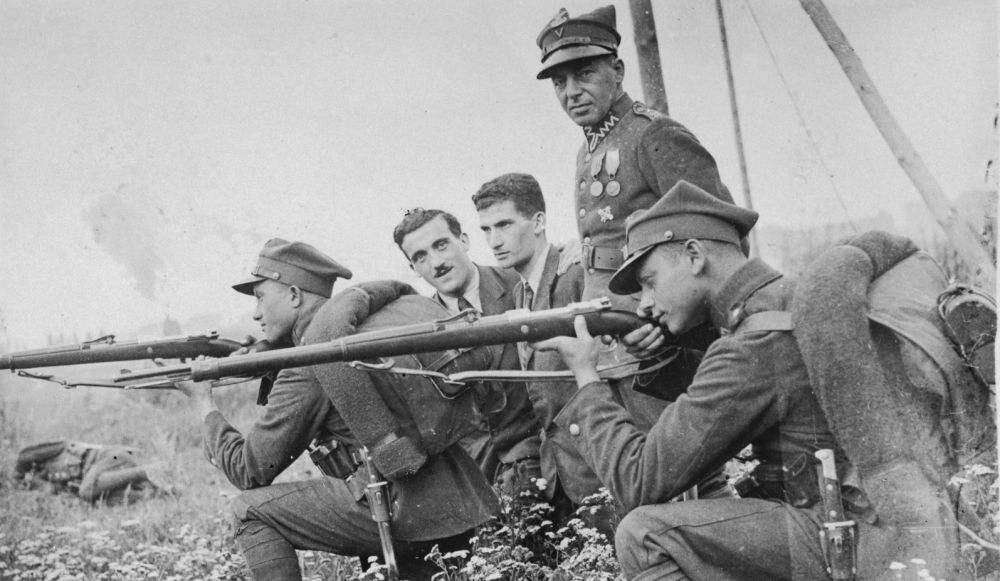
Polish Jewish soldiers of the Polish Armed Forces practice shooting, Warsaw 1937. In the center, in civilian clothing, brothers Majer and Nissan Rozenthal. Only Majer managed to survive the war. /
Of around 1 million Polish soldiers who took part in the 1939 defensive war against Germany and the Soviet Union, some 100,000 had Jewish background[1]. Circa 250,000 Polish soldiers were captured by the Soviets [2], including some 20,000 Polish Jews, in this number 150 Polish Jewish officers. Historians estimate differing numbers of Polish Jewish POWs in the USSR. Benjamin Meirtchak maintains that 231 officers of Jewish descent were murdered in Katyn, 188 in Kharkov and 19 in Tver – 438 in total [3]. Simon Schochet considers that, military doctors including, as many as 700–800 Polish Jewish POWs could have been murdered by the Soviets in Spring 1940. Poland’s Institute for National Remembrance gives the total number of murdered officers as at least 21,768 [5].
Officers murdered on the order of Joseph Stalin were mostly not professionals, but reserve soldiers mobilized in 1939. In civilian life they belonged to Poland’s intellectual elite: lawyers, teachers, civil servants, doctors. Their background was diverse: many of them were ethnic Ukrainians, Belarusians, Jews, Tatars or Lithuanians.
We present bios of seven Polish Jewish officers, who were murdered in Katyn, Kharkov and Tver in spring 1940.
Baruch Steinberg
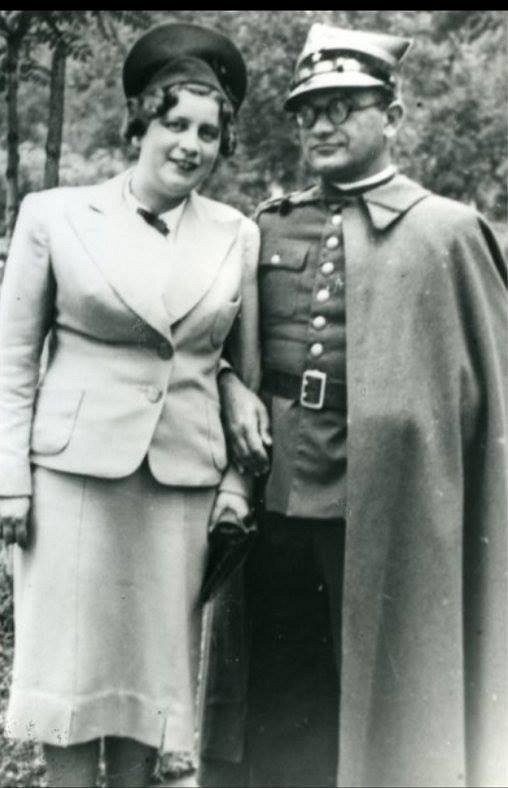
Baruch Steinberg was born in 1897 in Przemyślany near Lwów. He became a rabbi during the First World War. In November 1918 he joined Józef Piłsudski’s Polish Military Organization and took part in fighting for Lwów. In 1922 he joined the Polish Armed Forces, became a rabbi chaplain (in 1930 he was promoted to senior rabbi, second class – equivalent of a major rank). Since 1936, he was the Chief Rabbi of the Polish Armed Forces. At the time, he graduated from oriental studies at the University of Lwów. In 1939, as one of seven rabbis serving in the Polish Armed Forces, he was Chief Chaplain for Noncatholics in the Army Kraków. Imprisoned in Starobilsk, Kozelsk and Moscow, murdered in Katyn in April 1940.
Mieczysław Birnbaum
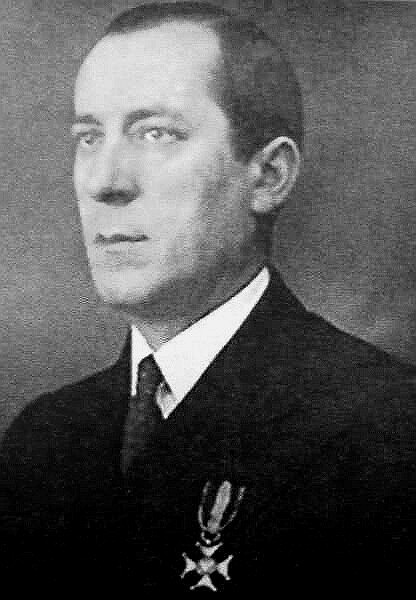
Translator and journalist, also known as Mieczysław Binom. Born in 1889 in Częstochowa. His father was hazzan Abraham Ber Birnbaum, his sister was actress Helena Gruszecka and his nephew was writer and translator Jerzy Pomianowski. Belonged to Józef Piłsudski’s Polish Socialist Party – Revolutionary Faction and Polish Military Organization. In 1918 was one of general Józef Haller’s three envoys to the Soviet government, negotiating the evacuation of Polish II Corps beyond the Dneper river (the Bolsheviks declined and the Germans defeated the Corps in the battle of Kaniów). During the 1919–1921 Polish-Soviet War, as Piłsudski’s emissary he took part in secret negotiations in Mikaszewice. Birnbaum translated works of Isaac Babel, Anton Chekhov, Yevgeniy Zamyatin. Arrested by the NKVD in autumn 1939, murdered in Katyn. Recipient of Virtuti Militari and Cross of Valour.
Abram Bombel
Doctor, born 1892 in Skierniewice. Also known as Antoni Bombel. His father, Mosze Bombel, owned a building materials wholesale. Studied at Faculty of Medicine at the University of Warsaw. During the Polish-Soviet War belonged to the staff of sanitary train named after Helena Paderewska (wife of pianist and statesman Ignacy Paderewski). In 1927 promoted to second lieutenant, he lived in Warsaw with his wife Irka and worked as internist and gynecologist. Murdered in Katyn. Three of his siblings were murdered by the Germans in the Majdanek concentration camp.
Henryk Brendel
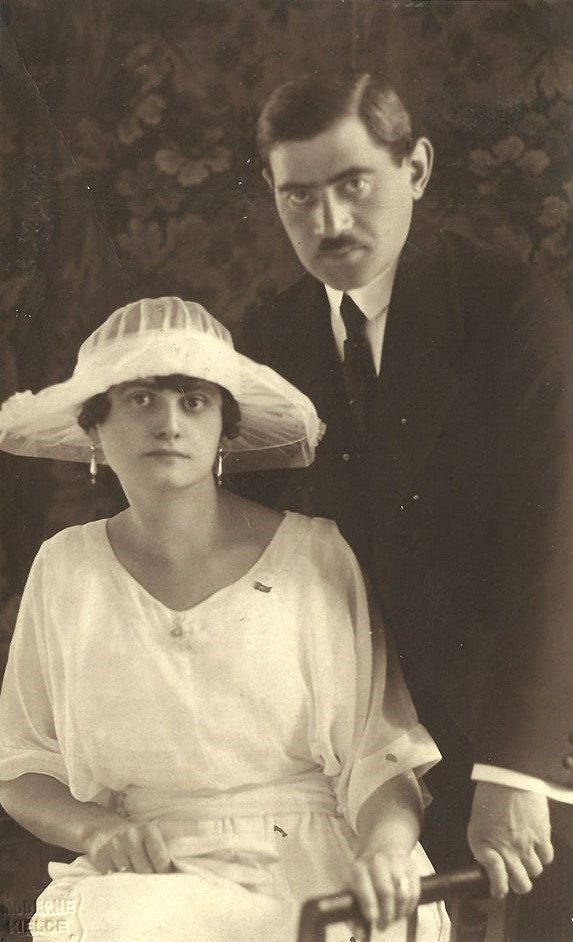
Doctor, born 1885 in Lwów, in assimilated Jewish family of Aleksander and Helena, nee Weingarten. Obtained the degree of doctor of medical sciences at the University of Lwów, specialized in dermatology and venereology, worked in German clinics. During the Polish-Soviet War worked in Ujazdowski Hospital (Szpital Ujazdowski) in Warsaw, later in military hospitals in Bielsk, Baranowicze, Suwałki, Lublin and Osowiec. In 1922 went to reserve as a captain. Lived with wife Eugenia and son Bolesław in Chełm, later in Płock. Imprisoned in Kozelsk, murdered in Katyn [6].
Bronisław Karbowski
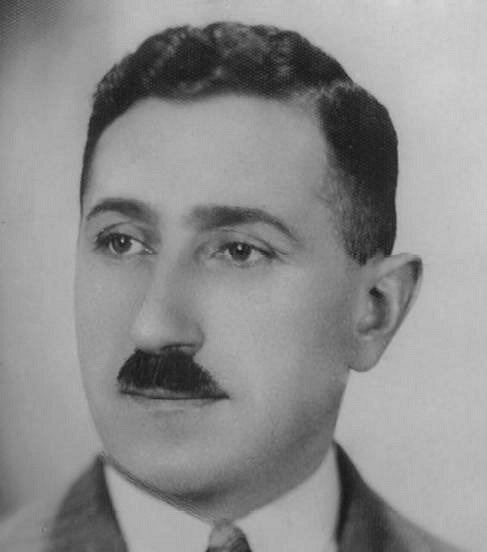
Doctor, also known as Berek Karbowski. Born 1884 in Łomża. His father, Lejb Karbowski, was a hotelier. Studied medicine in Germany, Switzerland and Russia, specialized in laryngology. Served in the Russian Army during the First World War, later in general Haller’s Blue Army in France. Commanded field hospital no. 207 during the Polish-Soviet War, promoted to major. In the 1930s was head of the ENT department at the Jewish Hospital in Warsaw (Szpital Starozakonnych w Warszawie) at Dworska 17 street (today Szpital Wolski at Kasprzaka 17) [7]. Wrote scientific papers in the field of medicine. Lived at Zamenhofa 6/21 street with wife Paulina Seidenbeutel. They had a son, Kazimierz. Imprisoned in POW camp in Starobilsk, murdered in Kharkov. His wife died of typhus in the Warsaw ghetto.
Wiktor Choczner
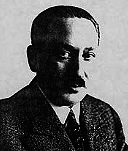
Born 1893 in Cracow to Marian and Salomea, nee Fischel. Fought in the Austrian Army during the First World War, on the Italian front. A trader, worked in Commercial Bank (Bank Komercyjny) in Cracow as senior proxy. Second lieutenant of reserve, military district no. V (Okręg Korpusu Nr V), Cracow. Married Jadwiga, nee Gregorczyk, with whom he had a daughter, Irena [8]. Murdered in Katyn.
Maksymilian Landau
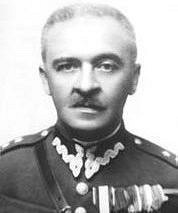
Born 1882 in Kamionka Strumiłowa near Lwów to Ludwik and Rozalia, nee Wolkenberg. Graduated from University of Lwów. Taught Polish and German at junior high school (gimnazjum) in Brody. During the First World War served in 1st artillery regiment, Polish Legions (Legiony Polskie). During the Polish-Soviet War received the Order of Virtuti Militari, Fifth Class, after combat on the banks of Berezyna. In 1927 promoted to lieutenant colonel of artillery, retired in 1934. In 1938 became headmaster of Edward Rontaler’s Gymnasium in Warsaw. During the 1939 defensive war was in charge of artillery of Lwów Defense Group Command. Also received Order of Polonia Restituta and Cross of Valor. Murdered in Kharkov.
Sources:
Archiwum Ringelbluma, v. 15, Wrzesień 1939. Listy kaliskie. Listy płockie, ed. Tadeusz Epsztein, Justyna Majewska, Aleksandra Bańkowska, Warszawa 2014, p. 10–11 (with footnotes).
Brendel Henryk Napoleon, [in:] Indeks represjonowanych, t. 21: Zabici w Katyniu. Alfabetyczny spis 4415 jeńców polskich z Kozielska zabitych w kwietniu–maju 1940, według źródeł sowieckich, polskich i niemieckich, ed. A. Gurjanow, A. Dzienkiewicz, Warszawa 2013.
Szymon Datner, Żydzi w walkach narodowowyzwoleńczych o całość i niepodległość Polski, „Biuletyn Żydowskiego Instytutu Historycznego” no 1/109, 1979, p. 17–40.
Albin Głowacki, Jeńcy września w niewoli sowieckiej w 1939 r. przed zagładą, w: W przeddzień zbrodni katyńskiej. Agresja sowiecka 17 września 1939 roku, ed. Marek Tarczyński, Warszawa 1999, p. 24–68.
Marek Jerzy Minakowski, https://minakowski.pl/krakowscy-zydzi-ofiary-katynia/
Zofia Podgórska-Klawe, Szpital Starozakonnych w Warszawie cz.2, „Pamiętnik Towarzystwa Lekarskiego Warszawskiego” 2008, http://www.tlw.waw.pl/index.php?id=25&newsy_id=186
The Holocaust in the Soviet Union: Studies and Sources on the Destruction of the Jews in the Nazi-occupied Territories of the USSR, 1941–45, red. Lucjan Dobroszycki, Jeffrey S. Gurock, foreword by Richard Pipes, Routledge, New York 1994.
Footnotes:
[1] Szymon Datner, Żydzi w walkach narodowowyzwoleńczych o całość i niepodległość Polski, „Biuletyn Żydowskiego Instytutu Historycznego” no 1/109, 1979, p. 35.
[2] Albin Głowacki, Jeńcy września w niewoli sowieckiej w 1939 r. przed zagładą, w: W przeddzień zbrodni katyńskiej. Agresja sowiecka 17 września 1939 roku, ed. Marek Tarczyński, Warszawa 1999, p. 28.
[3] B. Meirtchak, Jewish Military Casualties in the Polish Armies in World War II, t. 4, Tel Awiw 1994. Source: Archiwum Ringelbluma, t. 15, Wrzesień 1939. Listy kaliskie. Listy płockie, ed. Tadeusz Epsztein, Justyna Majewska, Aleksandra Bańkowska, Warszawa 2014, p. 10–11 (with footnotes).
[4] The Holocaust in the Soviet Union: Studies and Sources on the Destruction of the Jews in the Nazi-occupied Territories of the USSR, 1941–45, red. Lucjan Dobroszycki, Jeffrey S. Gurock, foreword by Richard Pipes, Routledge, New York 1994.
[5] https://ipn.gov.pl/pl/sledztwa/zbrodnia-katynska/24212,Zbrodnia-Katynska.html, access 31.03.2020.
[6] Brendel Henryk Napoleon, [in:] Indeks represjonowanych, t. 21: Zabici w Katyniu. Alfabetyczny spis 4415 jeńców polskich z Kozielska zabitych w kwietniu–maju 1940, według źródeł sowieckich, polskich i niemieckich, opr. i red. A. Gurjanow, A. Dzienkiewicz, Warszawa 2013, s. 171. Source: https://sztetl.org.pl/pl/biogramy/5039-brendel-henryk-napoleon-dawid, access 30.03.2020
[7] Zofia Podgórska-Klawe, Szpital Starozakonnych w Warszawie cz.2, „Pamiętnik Towarzystwa Lekarskiego Warszawskiego” 2008, http://www.tlw.waw.pl/index.php?id=25&newsy_id=186, access 30.03.2020 r.
[8] Source: Marek Jerzy Minakowski, https://minakowski.pl/krakowscy-zydzi-ofiary-katynia/, access 30.03.2020.